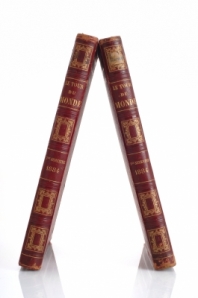 I’ve been an avid reader for as long as I can remember. I think the first novel I read was a Hardy Boys tale called The Tower Treasure. I remember devouring the Hardy Boys books as fast as I could get my hands on them. Finally, when I got a little older, maybe twelve, I moved on to bigger and better things like Stephen King and John Saul.
I’ve been an avid reader for as long as I can remember. I think the first novel I read was a Hardy Boys tale called The Tower Treasure. I remember devouring the Hardy Boys books as fast as I could get my hands on them. Finally, when I got a little older, maybe twelve, I moved on to bigger and better things like Stephen King and John Saul.
These days, I still read mainstream writers like King, John Sandford, James Lee Burke, and Greg Iles, to name a few. However, I also read a lot by Indie writers, those who couldn’t land the gargantuan books deals like the Kings, Pattersons, and Grishams of the world. I have thoroughly enjoyed many of these Indie books. Often, these works give me a glimpse into the growing pains experienced by developing writers, people who are making their bones in the ultra-competitive world of self-publishing and relentless self promotion.
I’ve been “reviewing” books since I started reading, passing judgment, both good and bad, on every book I have ever read. Mind you, it was only recently that started publishing these reviews on my blog. As an aspiring writer of genre fiction, I would want someone to give me an honest appraisal of my work. After all, if we only hear that our work is great, where is the opportunity  for growth and improvement? Every time I visit Amazon to grab a new Indie book, I am truly amazed at the number of five-star reviews many books receive. Folks, there are a lot of good books out there, many of which I would rate as four-star. There aren’t that many great books out there, at least not the large numbers I see on Amazon. The last five-star book I read was Creole Bell by James Lee Burke. That was over a year ago. I’ve read a lot of books since then.
for growth and improvement? Every time I visit Amazon to grab a new Indie book, I am truly amazed at the number of five-star reviews many books receive. Folks, there are a lot of good books out there, many of which I would rate as four-star. There aren’t that many great books out there, at least not the large numbers I see on Amazon. The last five-star book I read was Creole Bell by James Lee Burke. That was over a year ago. I’ve read a lot of books since then.
When I start a new book, the rating process starts when I read the first sentence. As I read, I look at five components: story/plot, character development, dialogue, consistency, and editing. The story or plot must be engaging, and unless I’m reading fantasy or science fiction, it must be plausible. As an example, I recently read a novel about the mafia. The mafia family discovered an undercover cop in their midst. They confronted him about it, and they let him walk away! I have studied the mafia for over twenty years, and can’t think of one instance where this happened. I guess there’s a first time for everything, but I fairly confident this would never happen.
Some authors just tell you about a character’s traits, both physical and emotional. This cheats the reader, and it is lazy writing. Character development is a subtle art form. Show me the character’s traits through their actions. And I don’t need a piece-by-piece inventory of what they are wearing, unless it is important and moves the story forward. I have an imagination; let me use it.
The ability to write good dialogue is an important skill. Good dialogue can make or break a novel. I know it when I see it. I also know bad dialogue when I see it, because my first reaction is always, “People don’t talk like that!” Some of the best dialogue writers, in my opinion, are John Sandford, Elmore Leonard (RIP!), and James Lee Burke.
When reading and reviewing a book, I also look for consistency in story details. Don’t have Bob driving a blue Corvette at the beginning of the book, and red one a hundred and fifty pages in. If something like this happens, it is also indicative of poor editing. More importantly though, I look for character consistency. In other words, is what a particular character doing consistent with what I know of about the character, or are they doing something out-of-character (pun intended) to accommodate the story or plot?
Finally, I look at editing, you know, the nuts and bolts stuff like grammar and spelling. Nothing turns me off quicker than a poorly-edited novel. I’ve read a few of these poorly-edited novels within the past several months, and I have to say it was hard not to quit them before the end. I didn’t walk away from these books because I wanted to give the authors an honest assessment of their work. After all, how are writers supposed to improve without constructive feedback.
 My process is simple. I read, and I rate as I go. The book may start rated 4-stars. This could go up or down as I progress through the book. It is a fluid process. I also take notes on the things I want to say about the book, and highlight certain passages that I can use to illustrate a certain point. I go with what my gut tells me, and I don’t over-think the process. Book reviews are subjective; no two will be the same because what speaks to one reviewer may not speak to another. If I had to put my rating scale into words, this is how it would read:
My process is simple. I read, and I rate as I go. The book may start rated 4-stars. This could go up or down as I progress through the book. It is a fluid process. I also take notes on the things I want to say about the book, and highlight certain passages that I can use to illustrate a certain point. I go with what my gut tells me, and I don’t over-think the process. Book reviews are subjective; no two will be the same because what speaks to one reviewer may not speak to another. If I had to put my rating scale into words, this is how it would read:
1-star: poor editing, poor plot, and poor character development.
2-star: I liked something about the book, but not much, and there was poor editing. Maybe there was a character I related to.
3-star: I like the book, meaning the plot moved me to a degree, and the characters weren’t cardboard, but I wasn’t blown away.
4-star: The book was good, and either the story or the characters were great, but not both.
5-star: I was blown away. Not many books get 5-stars.
Oh, and one more thing. Don’t flame authors by saying things like “That guy isn’t fit to write a restaurant menu” or “She couldn’t write an ad for socks.” Remember, these authors are pouring their hearts and souls into their work. Critique the work, not the writer. A few months ago, I had an author contact me requesting that I read and review her novel. Long story short, I gave it  two stars. There were multiple issues, including some pretty severe editing problems. I addressed the issues in my review, but I also talked about the things I liked about the book. I emailed the author when the review was posted. She emailed me back, and instead of being mad, she thanked me for the honest review and asked about my editing fees. I don’t know if I’ll get a gig editing her next book, but I was flattered (and surprised) that she inquired. If you get a reputation as someone who flames authors, requests for reviews will dry up. Now go and read and review, and have fun, because ultimately that’s what it’s all about.
two stars. There were multiple issues, including some pretty severe editing problems. I addressed the issues in my review, but I also talked about the things I liked about the book. I emailed the author when the review was posted. She emailed me back, and instead of being mad, she thanked me for the honest review and asked about my editing fees. I don’t know if I’ll get a gig editing her next book, but I was flattered (and surprised) that she inquired. If you get a reputation as someone who flames authors, requests for reviews will dry up. Now go and read and review, and have fun, because ultimately that’s what it’s all about.
